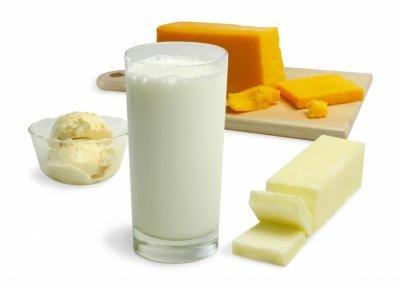Articles
Dairy, friend or foe?
- Font size: Larger Smaller
- Hits: 5833
- Subscribe to this entry
- Bookmark

There are varied opinions in the nutrition world about the benefits and/or drawbacks of including dairy in the diet. I have compiled my top 5 benefits and drawbacks for your interest. Please note that this is my personal opinion and in no way suggests that you should include or exclude dairy from your diet based on this opinion. Always consult your personal nutritionist before making any long term changes to your diet.
Benefits:
In no particular order, here follow what I consider to be the top five benefits of dairy products:
Probiotics:
‘Friendly’ intestinal bacteria, Lactobacillus acidophilus and Lactobacillus bulgaricus are used to make yoghurt and as such, yoghurt can be an useful aid in digestion. Acidophilus yoghurt helps to reimplant normal colon bacteria, so yoghurt is a good food after having taken a course of anti-biotics which may have destroyed these bacteria. The friendly bacteria also aid in the production of many B Vitamins. In addition, yoghurt is low in fat and calories and contains good levels of calcium. Yoghurt is also helpful in preventing yeast infections in a woman’s vaginal tract.
Weight Control:
Milk is rich source of leucine, a branched chain amino acid. Because of the high leucine content, dairy proteins can help in weight control programmes. Leucine helps to increase fat loss and promotes lean muscle tissue, it also helps to regulate blood glucose levels. Muscle uses more calories than fat so leucine also contributes to weight control by helping to increase the muscle to fat ratio in the body.
Blood Pressure Control:
Casein and whey, both found in dairy, are rich sources of angiotensin converting enzyme inhibitory peptides, which have been shown to reduce blood pressure in various animal and human studies. Thus consuming low – fat (full fat would contribute to high blood pressure) dairy products could assist in keeping blood pressure normal in individuals who struggle with high blood pressure.
Cheese:
Cheese is a high protein, high calcium food which contains good levels of Vitamin A and other minerals and if well tolerated and used sparingly it can be a nutritious addition to a well-balanced diet. However, moderation is key and low fat, low sodium cheeses are the healthiest options. Sheeps
or goats milk cheeses are available for those avoiding cow’s milk products in particular.
Source of short and medium chain fatty acids:
Butter, a dairy product, is a good source of short and medium chain fatty acids. It is a healthier option than margarine, especially with regards to the processing margarine undergoes in order to achieve the smooth end result. Butter also has antimicrobial, anti-tumour, anti-fungal and immune stimulating properties. Butter is also a good source of the trace minerals chromium, iodine, manganese, zinc and selenium. Butter also has the advantage of being directly absorbed by the small intestine. If good olive oil is not available I usually find butter to be a good alternative to melt over vegetables or use to stir-fry foods with.
Drawbacks:
Again, in no particular order, here follow, in my opinion, the top five drawbacks of dairy and dairy products:
High fat content:
Fat in milk and milk products could increase cholesterol and blood triglyceride levels which can create problems with high blood pressure and heart disease. Full fat milk products can include butter, cream, ice-cream and full fat cheeses and ‘drinking’ milk. Low fat versions are usually available (not for butter) but this affects the Vitamin D and Vitamin A content of those products.
Poor absorption of nutrients:
Excess consumption of milk and milk products for an extended period of time can cause poor mineral absorption in the intestines. This is because stomach acid is neutralised by milk which often leaves protein partially digested. Milk also causes extra mucous production in the intestines, this
mucous lines the intestinal wall forming a hardened lining with food residues and so it becomes difficult for minerals and other nutrients to be absorbed. Strangely enough calcium absorption suffers when has been drinking milk or eating milk products for a long time, this is because milk helps alkali forming putrefactive bacteria to live in the intestine, which creates conditions unsuitable for the absorption of many minerals, especially calcium. Thus even though milk contains high levels of calcium, the consumption of milk can prevent that calcium from being properly absorbed!
Cancer:
Recent studies have found a link between lactose and ovarian cancer. This is because lactose is believed to over-stimulate hormone production which causes tumour growth. High levels of oestrogen, which is found in pregnant cows has been cited as a possible contributing factor in the cause of breast cancer.
Osteoporosis:
There is an inverse relationship between calcium and protein. High protein intake results in calcium loss. As dairy is a high protein food, a high dairy intake could deplete calcium levels in the body, causing a higher risk of developing osteoporosis later in life.
Production of phlegm:
Consuming high levels of dairy causes the production of phlegm, often aggravating asthma. People with dairy sensitivities also find that consuming these products can cause outbreaks of eczema, removing dairy from the diet will often cause the eczema to disappear.
Conclusion:
I feel that if we all could consume raw, organic milk and milk products made from raw milk, which was not further processed or heated unduly then we could probably derive quite a lot of benefit from these products.
I don’t think that anything in excess is good for the body but a moderate intake of raw milk and milk products should not affect a healthy body in a negative way and can be a good and enjoyable part of a well-balanced diet.
I do not feel that the ‘evil’ here is necessarily dairy but rather the processing which changes that dairy. As with many things, the original, raw and organic version is best for us and the planet.

